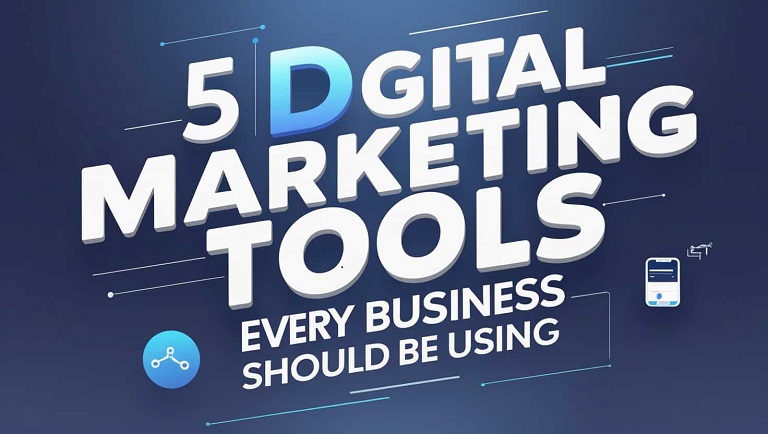Top 5 Digital Marketing Tools

“Can you guess the most surprising thing about digital marketing? It’s not just for big companies with deep pockets. Nope—small and medium-sized businesses that use the right digital marketing tools grow 2.8 times faster than those that don’t. Seriously! Whether you’re running a cozy bakery, a scrappy tech startup, or an online shop, the right tools can help you connect with your audience, crush your sales goals, and leave your competitors in the dust.
In today’s digital world, having a strong online presence isn’t just a bonus—it’s a must. But let’s be real, with so many tools out there, figuring out where to start can feel like a total headache, especially when it comes to nailing SEO for your business. Don’t worry, though—we’ve got you covered. In this post, we’re breaking down the top 5 digital marketing tools every business needs, why they’re awesome, and how they can help you smash your goals—whether that’s driving more traffic, acing your SEO game, or just getting your brand out there.
1. Google Analytics
Google Analytics is a powerful tool that provides insights into your website’s performance, helping you make data-driven decisions.
- Key Features:
- Traffic Analysis: Understand where your website traffic is coming from.
- User Behavior: Track user behavior and identify areas for improvement.
- Conversion Tracking: Measure the effectiveness of your marketing campaigns.
Example: A local bakery can use Google Analytics to track the number of visitors to their website and identify which pages are most popular.
2. SEMrush
SEMrush is an all-in-one marketing toolkit that helps businesses improve their online visibility.
- Key Features:
- Keyword Research: Identify the best keywords for your SEO strategy.
- Competitor Analysis: Analyze your competitors’ strategies and find opportunities.
- Content Marketing: Create and optimize content that drives traffic and conversions.
Example: A software company could use SEMrush to identify high-performing keywords and optimize its website content.
3. Ahrefs
Ahrefs is a comprehensive SEO tool that helps businesses improve their search engine rankings.
- Key Features:
- Backlink Analysis: Analyze your backlinks and identify opportunities for improvement.
- Keyword Tracking: Track your keyword rankings and monitor your progress.
- Content Explorer: Find popular content in your niche and create similar content.
Example: A travel agency could use Ahrefs to analyze their backlinks and identify opportunities to improve their SEO.
4. HubSpot
HubSpot is a powerful marketing automation tool that helps businesses streamline their marketing efforts.
- Key Features:
- CRM Integration: Manage your customer relationships and track interactions.
- Email Marketing: Create and send personalized email campaigns.
- Content Management: Manage your website content and optimize for SEO.
Example: A fitness coach could use HubSpot to manage their email marketing campaigns and track customer interactions.
5. Hootsuite
HubSpot is a powerful marketing automation tool that helps businesses streamline their marketing efforts.
- Key Features:
- Social Media Scheduling: Schedule and publish posts across multiple platforms.
- Analytics: Track the performance of your social media campaigns.
- Team Collaboration: Collaborate with your team and manage social media accounts.
Example: A local gym could use Hootsuite to schedule and publish posts on Instagram and Facebook, reaching a wider audience.
Conclusion
Digital marketing tools are a game-changer for businesses, offering unparalleled reach, targeting, and measurability compared to traditional methods. Whether you’re a small business owner or an aspiring entrepreneur, understanding and leveraging these tools can help you grow your brand and connect with your audience like never before. Ready to take the first step? Start by defining your goals and exploring one or two digital marketing tools. Share your thoughts or questions in the comments below—we’d love to hear from you!
FAQs
What are SEO tools, and why should I care?
SEO tools are basically your website’s best friends—they help you figure out how to rank higher on Google and get more traffic. Think of them as your cheat sheet for understanding what’s working (and what’s not) so you can attract more customers and grow your business.
Are SEO tools only for big companies?
Not at all! Whether you’re running a small shop, a startup, or a side hustle, SEO tools are for everyone. Plenty of them are budget-friendly or even free, so you don’t need to break the bank to get started.
Which SEO tool is best for beginners?
If you’re just dipping your toes into SEO, start with Google Analytics and Google Search Console—they’re free and super helpful. If you’re ready to level up, SEMrush and Ahrefs are super user-friendly and come with tons of guides to help you out.
What’s the difference between free and paid SEO tools?
Free tools like Google Analytics are great for basic insights, but they’re pretty limited. Paid tools like SEMrush or Ahrefs give you way more features, like competitor analysis, detailed keyword tracking, and content optimization. If you’re serious about SEO, a paid tool is worth the investment.
What’s the best SEO tool for keyword research?
SEMrush and Ahrefs are the go-to tools for keyword research. They help you find keywords that are popular but not too competitive. If you’re on a budget, Google Keyword Planner is a free option, though it’s a bit more basic.
Free SEO Audit
Are you looking to improve your website’s search engine performance but don’t know where to start? I offer a free 5-minute SEO audit to give you a quick snapshot of how your site is performing.


